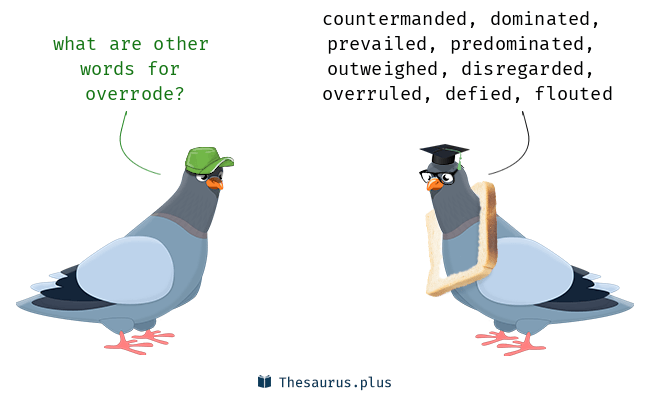
verb (used with object), o·ver·rode, o·ver·rid·den, o·ver·rid·ing.
- to prevail or have dominance over; have final authority or say over; overrule: to override one’s advisers.
- to disregard, set aside, or nullify; countermand: to override the board’s veto.
- to take precedence over; preempt or supersede: to override any other considerations.
- to extend beyond or spread over; overlap.
- to modify or suspend the ordinary functioning of; alter the normal operation of.
- to ride over or across.
- to ride past or beyond.
- to trample or crush; ride down.
- to ride (a horse) too much.
- Fox Hunting. to ride too closely behind (the hounds).
noun
- a commission on sales or profits, especially one paid at the executive or managerial level.
- budgetary or expense increase; exceeding of an estimate: work stoppage because of cost overrides.
- an ability or allowance to correct, change, supplement, or suspend the operation of an otherwise automatic mechanism, system, etc.
- an auxiliary device for such modification, as a special manual control.
- an act of nullifying, canceling, or setting aside: a congressional override of the president’s veto.
- Radio and Television Slang. something that is a dominant or major facet of a program or series, especially something that serves as a unifying theme: an entertainment series with a historical override.
verb -rides, -riding, -rode or -ridden (tr)
- to set aside or disregard with superior authority or power
- to supersede or annul
- to dominate or vanquish by or as if by trampling down
- to take manual control of (a system that is usually under automatic control)
- to extend or pass over, esp to overlap
- to ride (a horse) too hard
- to ride over or across
noun
- a device or system that can override an automatic control
v.Old English oferridan “to ride across,” from ofer “over” (see over) + ridan “to ride” (see ride (v.)). Originally literal, of cavalry, etc. Figurative meaning “to set aside arrogantly” is from 1827. The mechanical sense “to suspend automatic operation” is attested from 1946. As a noun in this sense from 1946. Related: Overrode; overriding; overridden.
 Liberal Dictionary English Dictionary
Liberal Dictionary English Dictionary